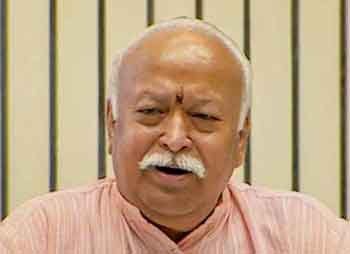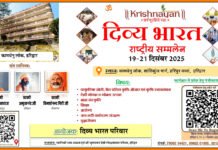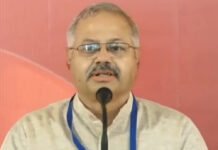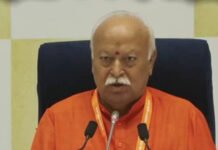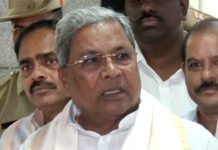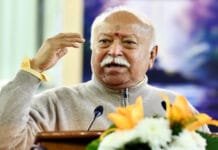Rashtriya Swayamsevak Sangh (RSS) chief Mohan Bhagwat arrived in Bilaspur, Chhattisgarh, where he released a souvenir dedicated to late Kashinath Gore, a noted public welfare activist. The program, held at the SIMS auditorium, was attended by several dignitaries, including Chhattisgarh Assembly Speaker Dr. Raman Singh.
The event began with a floral tribute to Bharat Mata’s portrait, setting the tone for a ceremony that combined remembrance, values, and a message of collective responsibility.
Mohan Bhagwat Pays Tribute to Kashinath Gore
In his address, Mohan Bhagwat reflected on the life and contributions of Kashinath Gore, remembering him as a true volunteer dedicated to public welfare. He emphasized that Gore lived a life of simplicity, self-service, and duty, always prioritizing society over personal gain.
Key Points from Bhagwat’s Speech:
RSS Journey of 100 Years: The Sangh has grown through discipline, hard work, and selfless service, despite challenges.
Meaning of Volunteerism: A true volunteer works for his family, neighborhood, nation, and ultimately humanity at large.
“Vasudhaiva Kutumbakam” Spirit: The Sangh believes in the philosophy that the entire world is one family.
Kashinath Gore’s Example: Though not everyone can be Kashinath, Bhagwat said, everyone should strive to be a volunteer for society.
Raman Singh Remembers Kashinath Gore
Former Chhattisgarh Chief Minister and current Assembly Speaker Dr. Raman Singh shared his memories of Kashinath Gore. He recalled Gore’s deep involvement in social service projects, particularly in Kawardha.
Bharatmata Hospital Connection: Raman Singh recounted how Gore was associated with the Bharatmata Hospital project, which has now grown into a significant initiative focusing on both education and healthcare.
Open and Inclusive Personality: Gore’s home was always open to people across social and political lines, reflecting his inclusive nature.
Political Guidance: Raman Singh credited Gore’s influence during his early days in politics, calling him a guide for many.
Sarcasm on Bhupesh Baghel’s Remarks
During the program, Raman Singh also responded sharply to Chhattisgarh’s former Chief Minister Bhupesh Baghel’s recent remarks on Mohan Bhagwat.
“Strange Statements”: Singh criticized Baghel, suggesting he speaks in haste and without full understanding of the Sangh chief’s words.
On Political Decency: He condemned the use of derogatory language against Prime Minister Modi, calling it unacceptable in democratic discourse.
Need for Maturity: Singh stressed that leaders should show greater maturity and respect in public life.
Significance of the Program
This event was more than just a tribute; it carried a deeper message about the RSS philosophy of service, inclusivity, and nation-building.
Highlighting Legacy: By remembering Kashinath Gore, the Sangh underlined the importance of grassroots volunteers in shaping society.
Political Undertones: With both Mohan Bhagwat and Raman Singh present, the program also carried political weight in the context of Chhattisgarh’s upcoming political landscape.
Public Messaging: The emphasis on unity, service, and family values resonates strongly with the RSS’s ongoing centenary reflections.
Conclusion: Tribute, Message, and Politics
The Bilaspur program served as a tribute to Kashinath Gore’s life of service, a reminder of the Sangh’s guiding principles, and a platform for political commentary.
While Mohan Bhagwat focused on volunteerism, discipline, and Vasudhaiva Kutumb, Raman Singh combined personal memories of Gore with political attacks on the opposition.
Together, the event reflected both the social mission of the Sangh and the political narratives shaping Chhattisgarh’s public discourse today.

